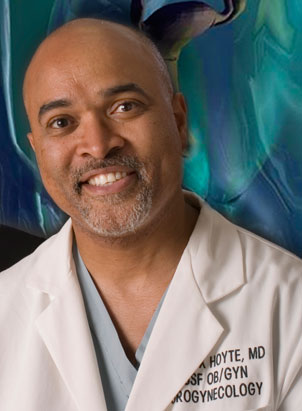Female Pelvic Medicine training program earns national specialty approval
USF’s Female Pelvic Medicine and Reconstructive Surgery (FPMRS) program is the first and currently the only FPMRS training program in Florida to be recognized by the American Boards of Urology and Obstetrics and Gynecology, said Lennox Hoyte, MD, MSEECS, associate professor and director of the FPMRS program in the USF College of Medicine.

The American Board of Medical Specialties (ABMS) recently voted to approve the FPMRS specialty nationally. This means that FPMRS fellowships are now formally recognized nationally, in the same way that Maternal Fetal Medicine, Gynecologic Oncology, and Reproductive Endocrinology specialties are recognized and approved. This means that women with prolapse, incontinence, bladder control problems and pelvic pain, can now receive care from FPMRS physicians who are specially trained and certified in this highly sub-specialized field of medicine.
In essence, graduating FPMRS fellows will be certified by the Board, Dr. Hoyte said.
In the United States, medical specialties and subspecialties are certified by the American Board of Medical Specialties (ABMS). As is typical for adding new specialties, the ABMS spent about 10 years monitoring the growing patient base for pelvic floor, bladder control and vaginal prolapse disorders, the three areas making up most of FPMRS care.
“Before the FPMRS era, physicians practicing ob/gyn and urology were each separately treating patients,” Dr. Hoyte said.
“Those physicians, over time and extensive training, improved and soon realized that the area should be a subspecialty because of the increased knowledge required. Until now, a patient needing treatment for problems affecting her pelvic floor, bladder and vagina, might have to visit at least two doctors, an ob/gyn and a urologist. But she’s not three women. She’s one woman with three health issues. It became clear there should be a single specialty that meets all of her healthcare needs.” The FPMRS subspecialty was designed to train gynecologists and urologists to care for women with complex pelvic floor disorders.
The next step for the subspecialty certification is building an exam to assess competency, thus allowing appropriately trained physicians the opportunity to become board certified in FPMRS.
Dr. Hoyte completed formal fellowship training in FPMRS, and started the FPMRS fellowship training program at USF when he joined the faculty in 2006. The USF FPMRS program was approved by the Board in January 2011, and is one of 45 recognized FPMRS training programs nationally, and the only approved program in Florida. In addition to Dr. Hoyte, faculty in the USF FPMRS training program include Drs Stuart Hart, and Raul Ordorica.
With the new designation from the ABMS, FPMRS fellows may graduate from a certified program and be recognized as board eligible. Once they pass a board exam, they will become certified as FPMRS sub-specialists.
Renee Bassaly, MD, is USF’s first such fellow, as well as the first certified FPMRS fellow to graduate in Florida. She will join the USF College of Medicine FPMRS faculty in August. The other current FPMRS fellow is Mona McCullough, MD, who will begin the second of her three-year FPMRS training. Kristie Greene, MD, will start as USF’s first year FPMRS fellow in July 2011. Dr. Greene will graduate the USF residency training in OB/Gyn in June 2011.

